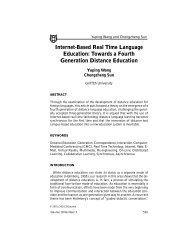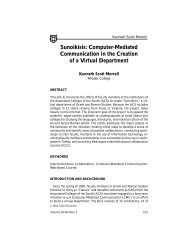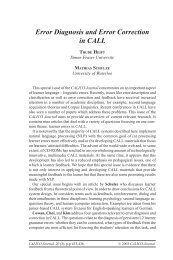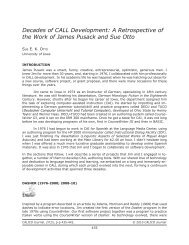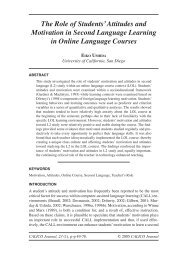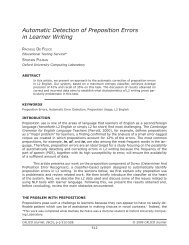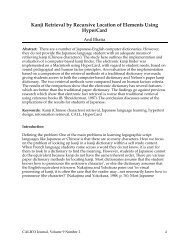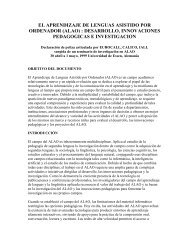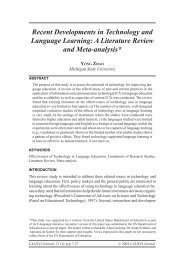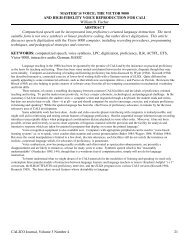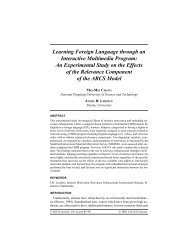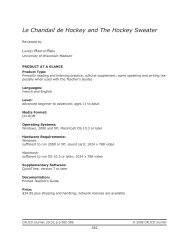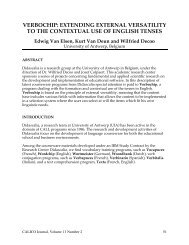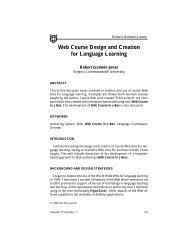Research on CALL and Distance Learning: A Briefly Annotated ...
Research on CALL and Distance Learning: A Briefly Annotated ...
Research on CALL and Distance Learning: A Briefly Annotated ...
You also want an ePaper? Increase the reach of your titles
YUMPU automatically turns print PDFs into web optimized ePapers that Google loves.
Franco. H., Neumeyer, L., Digalakis, V. & R<strong>on</strong>en, O. (2000). Combinati<strong>on</strong> of machine scores for<br />
automatic grading of pr<strong>on</strong>unciati<strong>on</strong> quality. Speech Communicati<strong>on</strong>, 30 (2-3), 121-130.<br />
Keywords: pr<strong>on</strong>unciati<strong>on</strong>, French, speech recogniti<strong>on</strong><br />
Summary: Argues for using a combinati<strong>on</strong> of speech recognizing algorithms as opposed to a single <strong>on</strong>e in order to<br />
best predict the rating of a human evaluator; finds that n<strong>on</strong>linear models outperform linear models<br />
Freiermuth, M., & Jarrell, D. (2006). Willingness to communicate: Can <strong>on</strong>line chat help?<br />
Internati<strong>on</strong>al Journal of Applied Linguistics, 16 (2), 189-212.<br />
Keywords: English, chat<br />
Summary: Compared language produced in chat-mediated tasks <strong>and</strong> face-to-face tasks; found that subjects (female<br />
Japanese EFL students) felt more comfortable interacting in chat tasks<br />
Freiermuth, M. R. (2001). Native speakers or n<strong>on</strong>-native speakers: Who has the floor? Online<br />
<strong>and</strong> face-to-face interacti<strong>on</strong> in culturally mixed small groups. Computer Assisted<br />
Language <strong>Learning</strong>, 14 (2), 169-199.<br />
Keywords: English, chat<br />
Summary: Finds greater n<strong>on</strong>native speaker output in <strong>on</strong>line setting compared to face-to-face setting; also examines<br />
qualitative differences between the settings<br />
Frisby, R. (2000). Digitisati<strong>on</strong> of audio files. Retrieved October 23, 2007, from<br />
http://www.aulc.org/audio/digitisati<strong>on</strong>.pdf<br />
Keywords: speaking, listening<br />
Summary: Describes how to make sound files <strong>on</strong> the PC<br />
Frisby R. (2004). Sound recording for language teachers. Retrieved October 23, 2007, from<br />
http://www.aulc.org/audio/digitisati<strong>on</strong>.pdf<br />
Keywords: speaking, listening<br />
Summary: Describes how to make sound files <strong>on</strong> the PC; appears to be updated versi<strong>on</strong> of Frisby (2000)<br />
Fuchs, C. (2006). Exploring German preservice teachers electr<strong>on</strong>ic <strong>and</strong> professi<strong>on</strong>al literacy<br />
skills. Re<strong>CALL</strong>, 18 (2), 174-192.<br />
Keywords: teacher training<br />
Summary: Explores preservice teachers' technological literacy<br />
Fuente, M. J. d. l. (2003). Is SLA interacti<strong>on</strong>ist theory relevant to <strong>CALL</strong>? A study <strong>on</strong> the effects<br />
of computer-mediated interacti<strong>on</strong> in L2 vocabulary acquisiti<strong>on</strong>. Computer Assisted<br />
Language <strong>Learning</strong>, 16 (1), 47-81.<br />
Keywords: vocabulary, chat<br />
Summary: SLA-based discussi<strong>on</strong> of vocabulary acquisiti<strong>on</strong> between chat <strong>and</strong> n<strong>on</strong>chat groups<br />
Fuentes, A. C. (2001). Lexical behaviour in academic <strong>and</strong> technical corpora: Implicati<strong>on</strong>s for<br />
ESP development. Language <strong>Learning</strong> & Technology, 5 (3), 106-129. (http://llt.msu.edu)<br />
Keywords: vocabulary, English, English for academic purposes, corpora<br />
Summary: Describes how corpora can be used to teach English-for-academic-purposes vocabulary<br />
38



